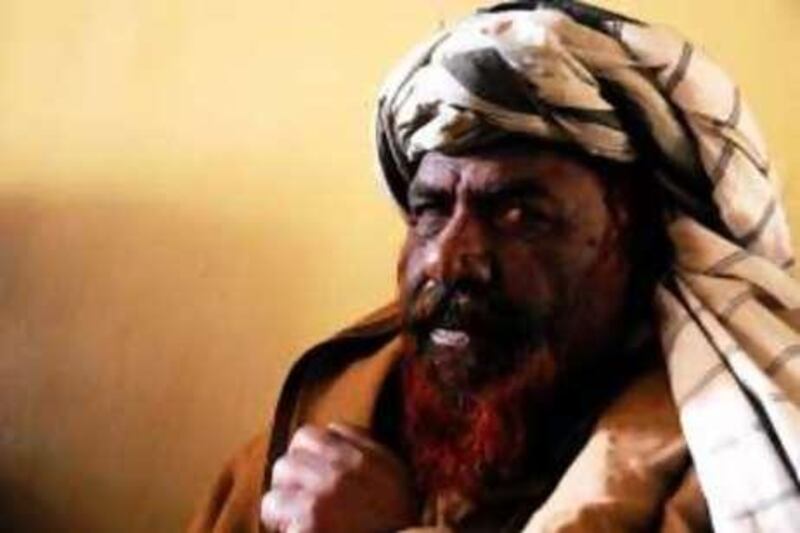KABUL // Tribal leaders from southeastern Afghanistan have called on the government and its US allies to change their tactics or risk facing a mass uprising. The elders and clerics from Paktika province said air strikes, house raids and arbitrary detentions are alienating the population. If they are not stopped, the kind of resistance experienced by the Soviets could soon develop. "During the time of the Russians all the people raised their hands and said they wanted jihad. Right now there are a few provinces doing this," said Sayed Abdul Hai Hashimi, an elder. "But if the government and the Americans keep arresting our teachers and religious people it is the end of the line and there will be no other way for us. We will have to start jihad." Paktika has been the scene of intense fighting this year. The US-led coalition frequently sends out press releases detailing its operations there, including a recent one in which eight militants linked to the senior Taliban commander Jalaluddin Haqqani were said to have been captured. However, elders are so enraged at what is happening in the province that dozens of them have come to Kabul in an effort to meet the president, Hamid Karzai. Mr Hashimi demanded that the government and its allies consult them when they want to detain any suspected members of the Taliban or al Qa'eda. Air strikes must also be halted. "This is the worst situation that we have faced in Paktika," he said. "The Russians were very good compared to this. They were not wild like the Americans." Violence has surged dramatically in Afghanistan this year. More than 260 foreign troops have already died, up from 232 in the whole of last year. Civilian casualties have also risen significantly. Eastern regions have experienced much of the bloodshed with a number of high-profile incidents. In Kunar province, nine US soldiers were killed when their base was attacked in the summer. The porous border with Pakistan has been singled out as a key reason for the trouble and last week Nato-led forces in Paktika launched artillery across the frontier after coming under rocket fire from insurgents. Those elders interviewed, though, had no complaints about the Taliban, who they said left residents alone. Their anger was directed squarely at the foreign troops and local officials. "The government should send us good people, then we can build our province and our country. How long should we work for the Americans? How long should they give us orders? How long should we be under their control? No, we don't need them and they should leave," Mr Hashimi said. Despite the heavy resistance faced by the US and Nato-led coalition forces in Afghanistan, popular support for the insurgency is not at the level it hit under the Soviet occupation of 1979 to 1989. But there are signs this could yet happen. Insecurity is spreading and discontent is common, even among people who hate the Taliban. A survey published by The Asia Foundation in October found that just 38 per cent of Afghans thought the country was heading in the right direction. In 2004 the figure stood at 64 per cent. Haji Mumin, part of the Paktika delegation, said the provincial governor was often involved in the arrests of civilians. Like his colleagues, he demanded that Mr Karzai remove him from his post. He also claimed US soldiers had failed to meet with elders to discuss any issues - what should be a standard practice in Afghan society. "They have never asked us to come sit with them. They have never asked us any questions about how to solve these problems and improve the province. They do not even think we are humans," he said. The elders have vowed to remain in Kabul until they see Mr Karzai, which they had still not done as of last night. Haji Abdul Hamid, another of the delegation, claimed to have been detained and physically abused by US soldiers. He said if he meets the president, "I will tell him, 'Look, this is all because of you. The Americans do not listen to you and if you cannot control them, resign'." In a telephone interview, a spokesman for Combined Task Force Currahee said troops in Paktika were "definitely keen" to open dialogue with elders and had done so in many parts of the province. "We're very big on getting out there and meeting with the locals and talking with them and going to the villages and doing village engagement," said Major Patrick Seiber. "But there is a two-way street. "As you know, a lot of these tribes are very, very proud and they don't want to have any tie whatsoever to anything that a government may provide." He said every effort was made to avoid civilian casualties and accused the Taliban of using human shields. "We don't deliberately target innocents, but we've got an enemy that doesn't discriminate against that. That's the fine line that we have to walk that the enemy doesn't," he said. csands@thenational.ae
Elders warn of popular revolt
Tribal leaders from southeastern Afghanistan have called on the government and its US allies to change their tactics or risk facing a mass uprising.

Editor's picks
More from the national




